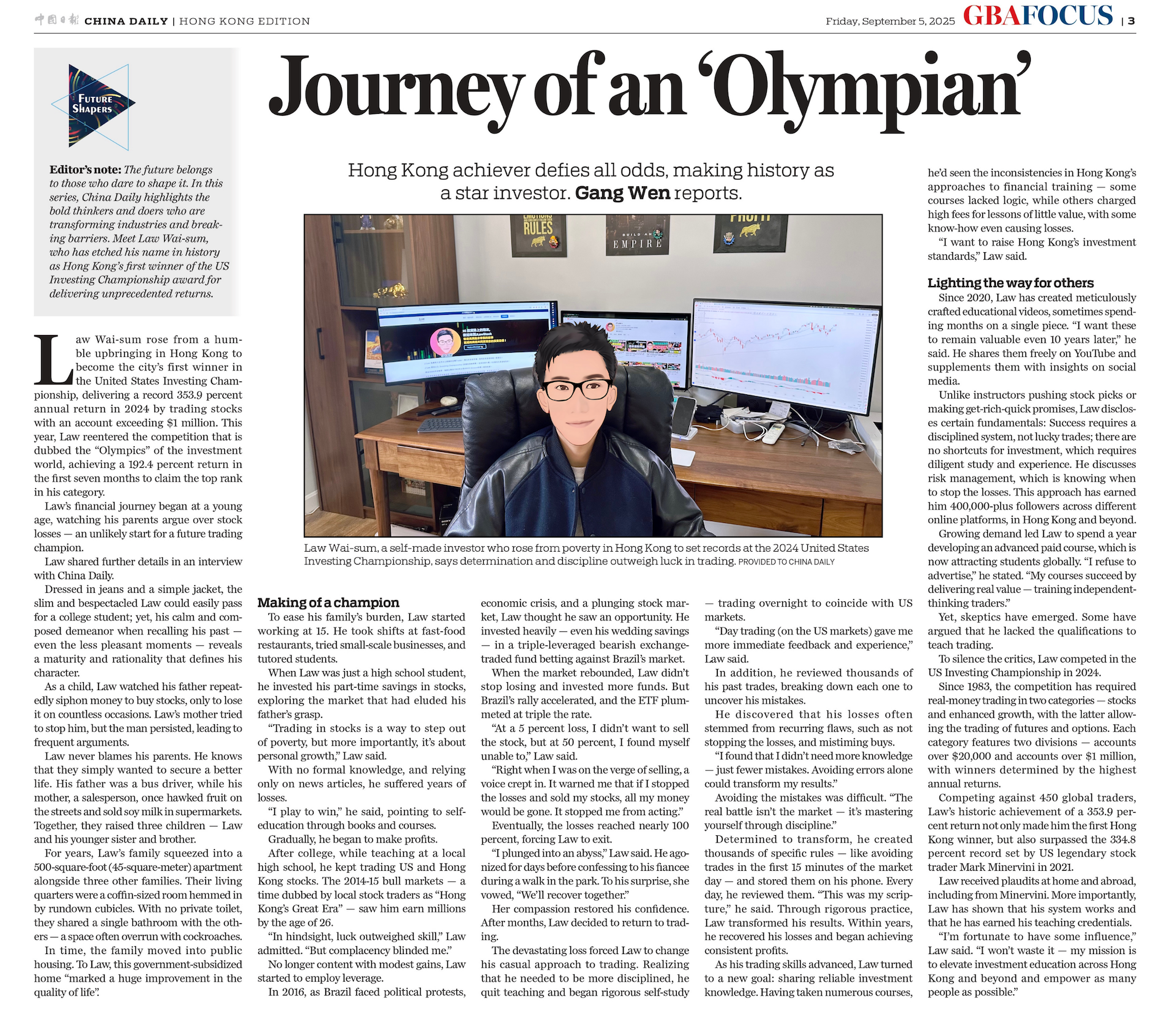J Law最新專訪|通往投資冠軍之路
(Editor’s note) On 5 September, Future Shaper—a special column under China Daily Hong Kong focusing on young individuals with significant influence on Hong Kong’s future—published an exclusive interview with J Law. This article presents the full, unabridged Chinese–English version of that interview, released with the original author’s authorisation. We are sharing this piece in the hope that more people can draw the courage to move forward and the strength to persevere from J Law’s setbacks and growth on his investment journey.
(編者語)9月5日,China Daily Hong Kong旗下的Future Shaper欄目——一個聚焦對香港未來有重大影響力的青年人物專刊——刊登了對J Law的專訪。本文為該專訪未刪減版的中英全文,經原作者授權發佈。我們分享這篇文章,是希望更多人能從J Law在投資路上的挫折與成長中,汲取前行的勇氣與堅持的力量。

(照片經編輯)
Journey of an “Olympian” / 通往投資冠軍之路
“In my childhood, my parents always argued because of stocks,” said Law Wai-Sum, who won the 2024 US Investing Championship in the $1M+ real-money account division by achieving a record-breaking 353.9 percent return.
“童年時,我的父母總是因為股票吵架,” 美國投資錦標賽冠軍J Law說。2024年,J Law在全美投資大賽一百萬真倉組別中,憑藉353.9%投資回報率打破了歷史紀錄,奪得了冠軍。
Dressed in glasses, wearing a simple jacket and jeans, with a slim build, Law could easily pass for a college student; Yet, his calm and composed demeanor when recalling his past — even the less pleasant moments — reveals a maturity and rationality that define his true character.
戴著眼鏡,身著簡單的夾克與牛仔褲,身形清瘦的J Law看上去像一名大學生;然而,他在回憶往事時——即便是那些並不愉快的片段——的沈著冷靜,流露出了他更真實的性格特質:成熟與理性。
As a child, Law watched his father repeatedly siphon money to buy stocks, only to lose it time after time. His mother tried to stop, but his father persisted, which fuelled frequent arguments.
童年,J Law看著父親一次又一次將錢丟進股市,卻屢戰屢敗;母親極力阻止,但父親不肯收手,兩人爭執不斷。
Yet Law never blamed his parents. He understood that they just wanted to secure a better life. His father was a bus driver, while his mother, a saleswoman, had once hawked fruit on the streets and sold soy milk in supermarkets. Together, they raised three children — Law and his younger sister and brother.
但J Law從未真正責怪過父母。他明白,他們只是想給這個家更好的生活。他的父親是一名巴士司機,母親是銷售員,她曾經在街頭賣水果,也曾在超市賣豆漿;夫妻倆生養了三個孩子——J Law以及他的弟弟與妹妹。
For years, Law and his parents squeezed into a 500-square-foot apartment alongside three other families. Their living quarters amounted to a coffin-sized room hemmed in by rundown cubicles. With no private toilet, they shared a single bathroom with the others — a space often overrun with cockroaches.
有好幾年,J Law家與另外三個家庭住在一間僅500平方英尺(約47平方米)的公寓裡。他們擠在那間公寓一處板間房裡。板間房棺材大小,四周被破舊木板圍起以和其他家庭隔開;房間沒有獨立廁所,J Law家只能與其他家庭共用一間蟑螂橫行的公廁。
In time, the family moved into public housing. To Law, this government-provided home “marked a huge improvement in the quality of life.”
再之後,J Law家搬去了政府公屋;“生活質量因此大大改善”,J Law說。
To ease his family’s burden, Law started working from 15. To make money, he took shifts at fast-food restaurants, tried small-scale businesses, and tutored younger students.
為了減輕家中負擔,J Law從15歲就開始打工。他曾在快餐店輪班,嘗試過小本生意,還當過家教。
At 20, he dipped his toes into stock investing.
直到20歲,他第一次嘗試股票投資。
Law, while still a student, heard a friend talking about using the stock market to make money. Intrigued, Law decided to test the waters by himself.
那時,還在讀書的J Law聽到朋友提起可以通過股票賺錢,激起了好奇心,決定在市場中試水。
Without any financial knowledge, Law only relied on news articles and magazines to buy stocks.
沒有任何金融知識,他依靠新聞報導和雜誌資訊買賣股票。
Unsurprisingly, this strategy led to setbacks. After years of losses, Law decided to learn trading by himself.
不出意料,這種方式讓他輸了很多錢;虧損了好幾年,J Law決定自學交易。
“Whenever I play a game, I aim to win,” Law said.
“我無論玩什麼遊戲,都想要贏,” J Law 說。
Determined, he enrolled in courses and read countless books on trading. Over time, as he weathered bull and bear market cycles, his skills sharpened, and he began to make some profits.
J Law開始上股票課,閱讀投資書;不斷經歷牛熊市,他的交易技巧逐漸提高,終於開始有所獲利。
After college graduation, Law took a job as a high school teacher. Outside the classroom, he continued trading stocks in both the US and Hong Kong markets.
大學畢業後,他成為一名中學教師;在課堂之外,他繼續進行美股港股交易。
In 2014, a bull market took hold in the U.S. The next year, the Hang Seng Index rocketed, ushering in an exceptional bull market in Hong Kong — the so-called “Great Era of Hong Kong stocks” by residents in the city.
2014 年,美國迎來一波牛市;翌年,恆生指數急速上揚,香港也進入了被市民稱為「港股大時代」的罕見牛市。
Seizing the moment, Law amassed millions at a young age.
抓住這一時機,J Law積累了百萬資產。
“To be honest, the money I made back then owed more to fortunate timing than my trading abilities,” Law said. “But I was too complacent to recognize that at the time.”
“老實說,那些年我能賺到錢更多是靠運氣而不是靠交易技術”,J Law 說,“但那時,我太自傲了,沒有意識到這點。”
No longer content with modest gains, Law sought to amplify his wealth by using leverage.
不再滿足小幅獲利,他開始使用槓桿來擴張財富。
Yet with greater potential rewards came heightened risk.
但這也意味著更大的風險。
In 2016, Brazil grappled with a cascade of crises: a million-strong march demanding the president’s impeachment, a devalued currency, an economic recession, and more — culminating in a steep plunge in the Brazilian stock market that year.
2016 年,巴西爆發了一連串危機:百萬人上街要求總統下台、貨幣大幅貶值、經濟陷入衰退……最終導致巴西股市急跌。
“The reality is, widely known news like this can’t justify trading decisions, and Brazil, as an emerging market, inherently means risk,” Law said. “But back then, I dismissed all those signs.”
“這類人盡皆知的新聞,根本不能作為交易的理據;而且巴西是新興市場,本身風險就很大”,J Law說,“但那時,我把這些事情全部忽略了。”
Law invested in a U.S. exchange-traded fund (ETF), one that was triple bearish on the Brazilian market — engineered to gain three percent for every one percent decline in the Brazilian index.
他買了一隻三倍看空巴西股市的ETF;巴西指數每下跌 1%,這隻ETF便上漲 3%。
However, the Brazilian market soon began to rebound. The ETF Law had purchased started to slide.
然而,巴西市場很快出現反彈;J Law買入的ETF開始下跌。
Reluctant to admit his mistake, Law poured in more money. He drew from profits he’d earlier gained from stocks. He even raided a nest egg he’d saved with his then-fiancée which would be used to buy a new house.
J Law不願承認錯誤;他不僅將過去炒股所得利潤再次投入這隻ETF,甚至還動用了與當時未婚妻一同為買新房準備的積蓄來加倉。
“I just wanted to multiply that money, as I think I could give my love a bigger house,” Law said.
“我當時就想把那筆錢滾大,給她一個更大的家”,J Law說。
But reality took a different course: Brazil’s index climbed sharply higher. The ETF Law had invested in plummeted, dropping at triple the rate of Brazil’s market gains.
但現實的劇本完全不同:巴西的股市大幅反彈,J Law買入的ETF以三倍速暴跌。
Still, Law refused to stem his losses.
即便如此,J Law依舊拒絕止損。
The stock’s downward slide continued.
那只ETF一路下滑。
“At a five percent loss, I didn’t want to sell the stock, but at fifty percent, I found myself unable to,” Law said. “Right when I was on the verge of closing my positions, a voice crept in. It warned me that if I stopped the loss, all my money would be gone. It paralyzed me, stopping me from acting.”
“虧損 5%時,我不想賣出,虧損50%時,我已經不能賣出了”,J Law說,“每次我想要平倉時,腦海中就會冒出一個聲音警告我說,「一旦賣出,你所有的錢就都虧光了」。恐懼讓我無力操作。”
“But if you don’t stop at fifty percent, the losses can snowball to sixty, seventy, or even a hundred percent of your investment.” Law continued.
“但是,如果你不在50%時止損,虧損會迅速擴大到 60%、70%,甚至100%。”
Finally, Law was forced to close his position. He lost all the money he had saved for the new house.
最終,J Law因虧光保證金被迫平倉,所有買房積蓄全部賠光。
“It felt as though I were plunging into a bottomless abyss,” Law said, “An icy chill coursed down my spine.”
“那一刻,好似墜入懸崖”,J Law說,“脊背都在發涼。”
Law struggled for days before mustering the courage to confess to his fiancée. That evening, as they strolled through the park, he told her his failure. He thought she would get angry or leave him. To his surprise, she didn’t get unhappy. She comforted him, told him that she always believed in him, and together, they could recover the lost money.
掙扎了好幾天,他鼓起勇氣向未婚妻坦白。那天晚上,他們在公園散步。他告訴她他輸光了買房積蓄。他以為她會生氣,會離開他。但她完全沒有責怪他,只是安慰他說,她相信他,只要兩人一起努力,錢總能賺回來。
Her love rebuilt his confidence. After several months, they got married and Law decided to go back to the stock market.
他在她的愛中重新找回了信心。幾個月後,他們結婚了,他也決定重返股市。
“I don’t like to give up,” Law said. “If I don’t succeed at something in one or two years, I’ll stick with it for four or five years, even ten years. I just believe that I can achieve my goal someday.”
“我不喜歡放棄。” J Law 說,“如果一件事一年做不成,那我就堅持四年、五年,甚至十年。我相信只要我堅持,我總有一天能實現目標。”
From defeat to triumph / 從挫敗到勝利
Defeat spurred Law into self-reflection. He found that, despite years of staying in the stock market, he’d never treat it seriously. To succeed, he needed to hold himself to a professional standard.
失敗迫使 J Law 自我反思。他意識到,雖然多年來他一直在交易,他從未以專業的態度嚴格要求自己。若要成功,他必須真正做到專業。
He left his teaching job, transitioning to other work that afforded him more time to trade stocks.
他辭去了教師職務,轉而從事一份能讓自己擁有更多時間專注於股市的工作。
To gain expertise, Law stayed up late into the night, syncing with U.S. time zones to do day trading.
為了磨練交易技術,J Law常需熬夜與美國時區同步,進行美股日內交易。
“Day trading gives me an immediate result,” he said. “So I was able to review my trades every day.”
“日內交易能即時反映交易成果,” 他說,“因此我能每天檢討自己的表現。”
Using months, he reviewed thousands of his past trades, breaking down each one to summarize his mistakes.
他又花了數月時間,翻看了過往做過的數千筆交易,逐一拆解並總結錯誤。
Then he discovered his loss often stemmed from some recurring flaws, such as not stopping losses, mistiming buys, and more.
他發現,自身虧損往往源於一些反覆出現的問題,例如不肯止損、買賣時機不對等等。
“That’s when it hit me,” Law said. “I found that what I needed most was not to learn more but to make fewer mistakes. Just sidestepping those errors could considerably improve my performance.”
“那時我才意識到,”J Law 說,“我最需要的不是學得更多,而是更少犯錯。只要改掉錯誤,我的表現就能大幅提升。”
Avoiding mistakes sounds simple, but it’s a huge challenge in practice, Law said.
不犯錯聽似簡單,落到實操卻很艱難。
“After years of study, I had acquired a wealth of trading knowledge, yet I could still lose spectacularly from a single trade. This experience taught me one lesson: understanding something in theory does not necessarily translate into the ability to execute it in real life.”
“經過這麼多年的學習,我明明掌握了那麼多交易知識,但都可能因為一筆交易而慘敗。這段經歷讓我明白了一個道理:理論上理解一件事,從不等於能在現實中真正運用它。”
“The real enemy isn’t the market — it’s myself,” Law said. “I have to be disciplined.”
“真正的敵人不是市場,而是我自己”, J Law說,“我必須自律。”
To change himself, Law wrote self-observation journals.
為了改變自己,J Law開始寫自我觀察日誌。
“It’s as though your soul slips out of your body, taking on another perspective, watching you from afar,” he said. “Then, it begins to outline the core of who you really are.”
“寫日記時好像你靈魂出竅,在遠處用另一種視角觀察自己,從而逐漸認清你到底是誰。”
“I found that I was an impulsive and emotional risk-taker,” he said. “So, I wrote down thousands of trading rules—like avoiding trades in the first 15 minutes after the market opens, and stored them in memos on my phone.”
“我發現自己是個很容易衝動、很情緒化的冒險者”,他坦言,“為了改變這一點,我給自己定下了上千條交易規則——比如開盤後前 15 分鐘絕不下單等等——並將它們存進了手機備忘錄。”
To ingrain these rules into his subconscious and weave them into his daily habits, Law reviewed them every day.
為了將交易規條深植於潛意識、融入日常習慣,J Law每天都會翻看手機備忘錄。
“It’s my prayer time,” he said, “like Muslims with the Koran or Christians with the Bible.”
“這是我的祈禱時刻”, 他說,“就像穆斯林誦讀《古蘭經》或基督徒誦讀《聖經》一樣。”
Through rigorous study, hands-on practice, and an unwavering commitment to self-discipline, Law recovered his losses in one year.
憑藉嚴謹學習、實戰磨鍊與嚴格自律,J Law 在一年之內便彌補了先前的損失。
From that moment, he never made any huge errors and began securing consistent profits in the stock market.
自此之後,他再也沒有犯過重大錯誤,並開始在股市中穩定獲利。
Lighting the way for others / 照亮他人的路
As his stock trading techniques continued to advance, Law set on a new mission: sharing high-quality investment knowledge with a broader audience.
隨著交易技術不斷精進,J Law給自己設立了一個新目標:向更多人分享高質的投資知識。
Having taken many investment courses himself, Law had witnessed firsthand the inconsistent quality of financial education in Hong Kong. Too often, these courses lacked coherent logic or a cohesive system. Some instructors demanded high fees for content that offered little practical value, even leading to financial losses.
在上過太多投資課程後,J Law發現香港的投資教育良莠不齊。許多課程缺乏清晰的邏輯與完整的體系,還有些講師收取高昂費用卻提供低質內容,甚至導致學員蒙受損失。
“I want to improve Hong Kong’s investment standards and its investment culture,” Law said.
“我希望能提升香港的投資水準,改善這所城市的投資文化,” J Law 說。
Starting in 2020, he began crafting educational videos, pouring weeks, sometimes months, into each one to ensure its quality.
自 2020 年起,他開始製作教授交易知識的影片;為了保證內容高質,每一條影片都要花費他數週甚至數月時間。
“I want people to revisit these videos even a decade later,” Law said.
“我希望人們再過十年回看這些影片,依然覺得他們有價值”, J Law說。
He uploaded them to YouTube for free while sharing additional insights on Facebook, Instagram, and other platforms.
他將影片免費上傳至 YouTube,並在 Facebook、Instagram 等平台分享投資見解。
In contrast to some instructors who promote specific stock picks, Law repeatedly emphasized that trading success hinges not on any single stock but on a logical and profitable trading system.
不同於某些講師熱衷於分享個股代號,J Law一再強調交易的成功不在於押中哪一支股票,而在於是否擁有一套邏輯統一、有正期望值的交易系統。
While some courses tout trading as a fast track to riches, Law told students and followers that investing demands diligent study and real market experience. “There are no shortcuts to wealth.”
坊間一些課程將投資包裝成快速致富捷徑,J Law則不斷提醒學員,投資需要勤學苦練與真實的市場經驗,“致富沒有捷徑”。
Noticing many instructors overlooked risk management, Law repeatedly stressed that the cornerstone of investing is always knowing to stop losses.
許多講師忽視了風險管理,J Law卻反覆強調:投資的基石永遠是懂得止損。
“In investment education, every word and action of a teacher can affect people’s wealth and their families’ well-being,” J Law said. “I hope to bring a positive influence to them.”
“做投資教育,老師的一言一行都會影響到人們的財富與家庭幸福,” J Law 說,“我希望我能給大家好的影響。”
Due to the high quality of his content, Law has amassed over 400,000 followers online.
憑藉高質內容,他在全網不同平台累積了超過 40 萬名粉絲。
As demand grew, some followers pressed for more advanced material, prompting Law to craft a paid teaching program. His courses now boast global students from Hong Kong, Malaysia, Taiwan, Mainland China, Singapore, and beyond.
隨著需求增加,一些粉絲想要學習更高階的投資知識,這促使他開發了付費課程。如今,他的學生遍及香港、馬來西亞、台灣、中國大陸、新加坡等地。
“I’ve never spent a dime on advertising my courses, and I never will,” Law said. “The best promotion is that my courses can deliver real value.”
“我從未花過一分錢為我的課程打廣告,將來也不會,” 他說,“因為最好的廣告,就是課程本身的價值。”
Yet, as he taught, skeptics emerged. Some argued he lacked a verifiable investment track record or third-party validation, and doubted his ability to teach.
然而,隨著教學展開,質疑聲也隨之而來。有人認為他缺乏可驗證的投資紀錄或第三方背書,懷疑他是否有資格教學。
To silence the noises, Law competed in the U.S. Investing Championship — widely regarded as the Olympics of the investment world — in 2024.
為了讓質疑聲平息,在 2024 年,J Law 參加了被譽為投資界奧林匹克大賽的「美國投資錦標賽」。
Since its inception in 1983, the competition has required participants to trade their own money in real accounts. It features two categories — US$1 million and US $20,000 — with a year-long trading period, culminating in a final tally where the highest return in each category claims victory.
自1983年創辦以來,該比賽要求參賽者必須用真金白銀操作真實帳戶,分為 100 萬美元組和2萬美元組,交易期長達一年,最終由回報率最高者奪冠。
Facing hundreds of competitors from the U.S., Canada, India, Europe, and beyond, Law entered the Million Dollar category and finally delivered a 353.9 percent return.
面對來自美國、加拿大、印度、歐洲等地數百名對手,J Law參加了百萬美元組,並最終贏得353.9%的回報。
This triumph not only crowned Law as the first Hong Kong resident to win this competition but also shattered the previous record of 334.8 percent in the one million dollar category — set by the American investment legend Mark Minervini — marking a new pinnacle in the competition’s history.
這一勝利不僅讓他成為首位奪冠的香港人,更打破了此前由美國投資傳奇Mark Minervini 在百萬美元組創下的334.8%紀錄,刷新賽事歷史新高。
Messages thanking Law for bringing pride to Hong Kong poured in, while many industry icons, including Mark Minervini, congratulated him.
各方傳來訊息感謝他為香港爭光,甚至包括 Mark Minervini 在內的眾多投資界重量級人物,也祝賀他取得勝利。
However, what truly excited Law was that he had proven his trading system works and established his credentials to teach.
然而,真正令J Law興奮的,是他證明了自己的交易系統確實有效,奠定了自己繼續投資教育的公信力。
“I’m lucky enough to have some influence and I don’t want to waste it,” Law said, “I want to raise the standard of investment education throughout Hong Kong and beyond, empowering more people. This is the next mission I’ll pursue.”
“我很幸運擁有一些影響力,我不想浪費它,” J Law 說,“我想提升香港乃至更多地區的投資教育水準,使更多人受惠。這,就是我下一個使命。”


